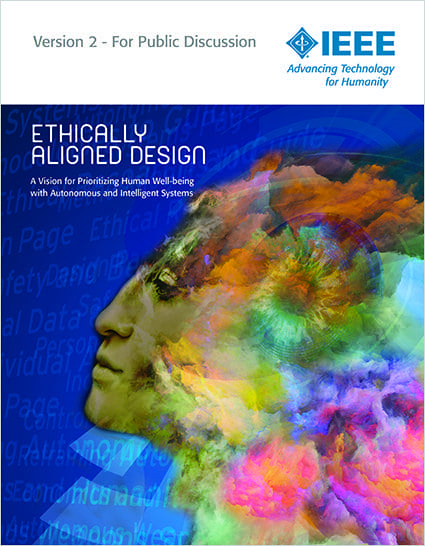 Whether you’re reading the cover blurb of a magazine at the grocery checkout line, or happen across a panel discussion while grazing television channels, there is an undeniable buzz about the potential human benefits, and possible pitfalls, associated with the advancement of autonomous and intelligent systems. An overriding opportunity in the midst of these discussions is how to measure and prioritize human wellbeing as it relates to these emergent technologies. By doing so, it will be possible to foster technological innovation that fully values mental and emotional health at both an individual and societal level.
Whether you’re reading the cover blurb of a magazine at the grocery checkout line, or happen across a panel discussion while grazing television channels, there is an undeniable buzz about the potential human benefits, and possible pitfalls, associated with the advancement of autonomous and intelligent systems. An overriding opportunity in the midst of these discussions is how to measure and prioritize human wellbeing as it relates to these emergent technologies. By doing so, it will be possible to foster technological innovation that fully values mental and emotional health at both an individual and societal level.
While the economic value of these systems is often the primary driver for technological development, it has become increasingly clear to a growing group of economic, industry, and academic experts around the world that a wider spectrum of measure than exponential growth and productivity needs to be applied when creating autonomous and intelligent products and services that will bring benefit to humanity.
Enter the IEEE standards project IEEE P7010TM—Wellbeing Metrics Standard for Ethical Artificial Intelligence and Autonomous Systems, sponsored by the IEEE Systems, Man, and Cybernetics Society. IEEE P7010 identifies wellbeing Indicators and metrics relating to human factors directly affected by autonomous and intelligent systems, and establishes a baseline for aligning the types of objective and subjective data these systems should analyze and include, in both programming and functionality, to proactively utilize these technologies to increase human wellbeing.
“The opportunity to synchronize existing globally recognized wellbeing indicators, like OECD’s Better Life Index or The Genuine Progress Indicator, with autonomous and intelligent technologies has massive potential benefit for society,” says John C. Havens, executive director, The IEEE Global Initiative on Ethics of Autonomous and Intelligent Systems and chair of the IEEE Wellbeing Metrics Standard for Ethical Artificial Intelligence and Autonomous Systems Working Group. “If technologists can determine how data and output from their systems align to existing Indicators, they can design them to provably increase wellbeing.”
The idea of identifying and aligning wellbeing metrics to the design of autonomous and intelligent systems is a central point to ongoing technological discussions and industry engagement efforts. What’s become clear is that programmers and technologists need to be provided these specific metrics of societal success beyond exponential growth and productivity to best honor human wellbeing.
According to Ljiljana Trajkovic, 2016-2017 Junior Past President, IEEE Systems, Man, and Cybernetics Society and IEEE Division X Delegate-Elect/Director-Elect, 2018: “Numerous IEEE activities are already proactively engaging industry, academia, and a multitude of stakeholders to create a broad and open forum for discussion and collaboration on standards and technology advancements related to autonomous and intelligent systems. There is already an agreement that we should act now in order to assure that humans and overall human well-being are carefully considered when building the most beneficial systems for humanity.”
To learn more about The IEEE Global Initiative on Ethics of Autonomous and Intelligent Systems, and the eleven standards projects currently underway, please visit The Global Initiative homepage.
On 12 December 2017, IEEE published the second version of Ethically Aligned Design: A Vision for Prioritizing Human Well-being with Autonomous and Intelligent Systems (EADv2). The document was created with input by multiple committees of The IEEE Global Initiative on Ethics of Autonomous and Intelligent Systems (“The IEEE Global Initiative”) that comprises over 250 global thought leaders and experts in autonomous and intelligent systems, ethics, and related issues.

